From the UK’s stance on China to each other’s wardrobes, Liz Truss and Rishi Sunak have clashed on a range of topics during their latest leadership debate.
The Foreign Secretary and former chancellor were also pushed to clarify whether they would deploy British troops to Ukraine and on how they felt about offering Boris Johnson a seat in their cabinets.
Here are the key points raised during the hour-long face-off aired by BBC News, and hosted in the Staffordshire city of Stoke-on-Trent.
– Mr Sunak accused Ms Truss of pursuing a closer relationship with China, something the Foreign Secretary vehemently disputed
Mr Sunak said: “There was a time when Liz was talking about having a golden era of relationships with China and the mission there was talking about having deeper collaboration with things like food security and technology.
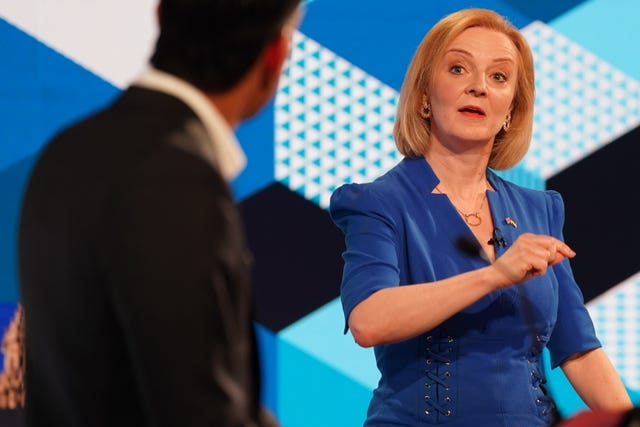
“But what we do need to do is acknowledge that China is a threat to our national security, it’s a threat to our economic security.”
He added that under his tenure as chancellor, the Government tabled the National Security Investment Bill, which gives the UK the power to “protect ourselves against countries like China who are trying to infiltrate our companies and steal our technology”.
Ms Truss interjected, saying: “Rishi, I challenged you on the debate last week.
“As recently as a month ago you were pushing for closer trade relationships with China.”
She accused Mr Sunak’s former department, the Treasury, of harbouring a desire for “closer economic relations” with China, while the Foreign Office has taken “the toughest stance” with the country including by “being clear that Taiwan should be able to defend itself”.
– Ms Truss said she would not deploy British troops in Ukraine, while Mr Sunak suggested the same but did not clearly state his stance
When asked if she would send the British Navy to defend Ukraine, Ms Truss said: “I am not prepared for the United Kingdom to become directly involved in the conflict.”
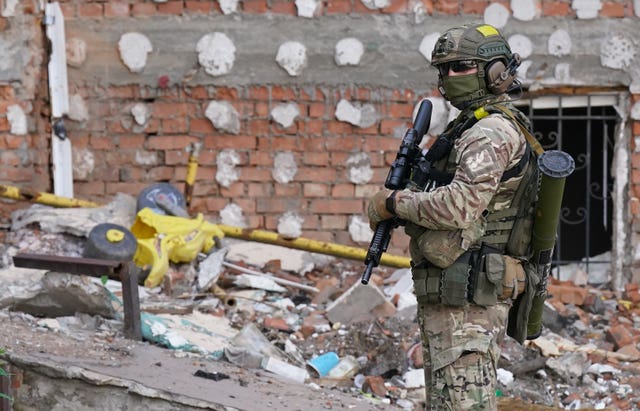
She said that the UK has done “as much as we can” including sending weapons and ensuring the release of grain from Odesa, but since Ukraine is not in Nato “it would be wrong to directly deploy our troops and resources”.
When asked the same question, Mr Sunak said: “I think actually we should take a step back and recognise that we have put together one of the strongest set of economic sanctions that the world has ever seen and that has really hampered Putin’s war effort.
“We also made sure that we supported Ukraine financially with the arms and weapons they needed to defend themselves, and actually that’s something that Liz and I worked together on.”
– The two leadership hopefuls tore into each other’s views of how best to handle the cost-of-living crisis, including tax
Ms Truss said crashing the economy to pay a debt back more quickly is “a massive mistake”, adding: “When you have a major world event, a major economic shock, trying to pay back the debt as quickly as possible is not the right thing to do economically.”
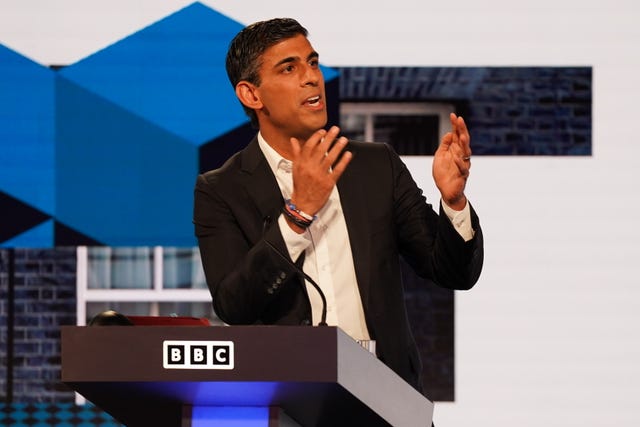
Interjecting, Mr Sunak argued that at a time of high inflation and rising interest rates, it is not “sensible” to “go on a massive borrowing spree worth tens of billions of pounds and fuel inflation”.
He also accused Ms Truss of promising “almost £40 billion of unfunded tax cuts…that is the country’s credit card”.
Responding to this, Ms Truss said: “Rishi that is not true, under my plans, we would start paying down the debts in three years’ time, Covid was a one in 100 years event, no other country is putting up taxes at this moment, the OECD has described Rishi’s policies as contractionary.”
– Liz Truss did not disown a cabinet colleague’s comments about the cost of Mr Sunak’s attire
Both were asked about Culture Secretary Nadine Dorries criticising Mr Sunak’s expensive wardrobe, while praising Ms Truss’ more modest clothes.
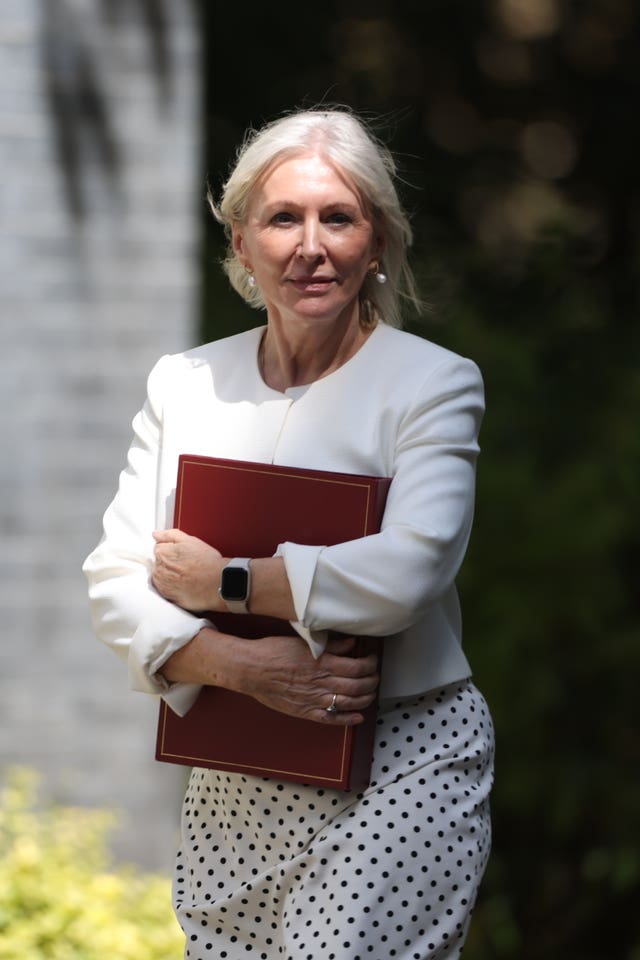
The former chancellor said: “I think in the Conservative Party, we judge people by their character and their actions.
“I’m proud of my record as chancellor in helping some of the most vulnerable people over the last couple of years.”
Ms Truss declined to “disown” the remarks made by Ms Dorries.
She said: “I am not going to give Rishi fashion advice. I mean, I have said he is a very well-dressed man. I’m not going to give him fashion advice.
“And I don’t think this is really the key issue in the campaign, frankly.”
– Boris Johnson will not be a cabinet minister in the next government, whoever becomes prime minister
When asked whether she would give the outgoing leader a role in her cabinet, Ms Truss said: “I just don’t think it’s going to happen”.
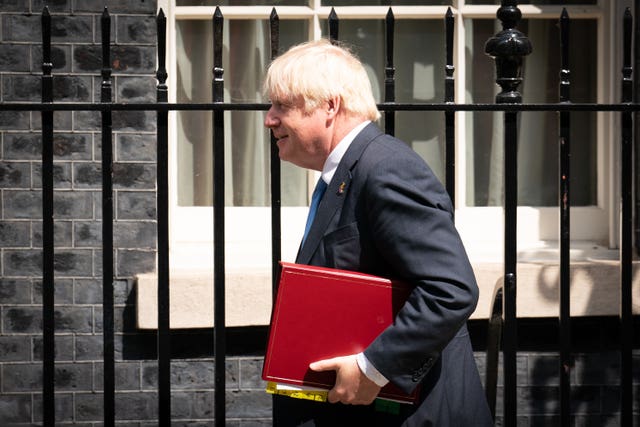
She added: “Having spent time with him this week on foreign affairs, I very, very much suspect that he would not want a future role in the Government, I think he needs a well-earned break from what has been a very difficult few years.”
Posed the same question, Mr Sunak said: “The simple answer from me is no, I think we need to look forward at this point, that’s why I want to be Prime Minister.”
– Ms Truss highlighted how she came from a landscape of “poor opportunities” growing up in West Yorkshire, while Mr Sunak elaborated on his family’s humble beginnings
The Foreign Secretary said: “I’m completely committed to levelling up.
“It’s not just a slogan for me, it’s about the life I’ve had, I’ve seen what happened in Leeds when children were let down by a combination of low expectations, poor opportunities and poor educational standards.
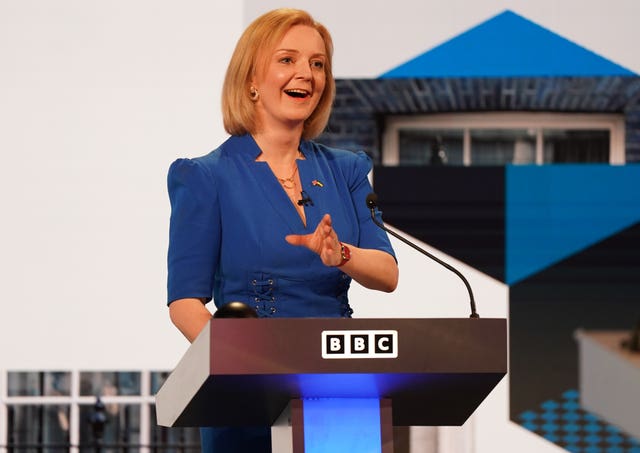
“So levelling up for me is about changing the Treasury investment rules so they’re fair across the country. At the moment, they favour London.”
Mr Sunak said: “My family emigrated here 60 years ago, I talked about my mom. She ran the local chemist in Southampton. That’s why I grew up working in the shop, delivering medicines. I worked as a waiter at the Indian restaurant, down the road.
“And I’m standing here because of the hard work, the sacrifice and love of my parents and the opportunities they provided to me, and that’s why I want to be prime minister because I want to ensure that everyone, your children and grandchildren have the very same opportunities that I had.”
He said that levelling up “should mean that no matter where you grow up, you have fantastic opportunities to fulfil your potential, but you also have enormous pride in the place that you call home”.
– Both candidates spoke about how they lead environmentally-friendly lives
Ms Truss said: “I was an environmentalist before it was fashionable. I was a teenage eco-warrior, campaigning against damage to the ozone layer.
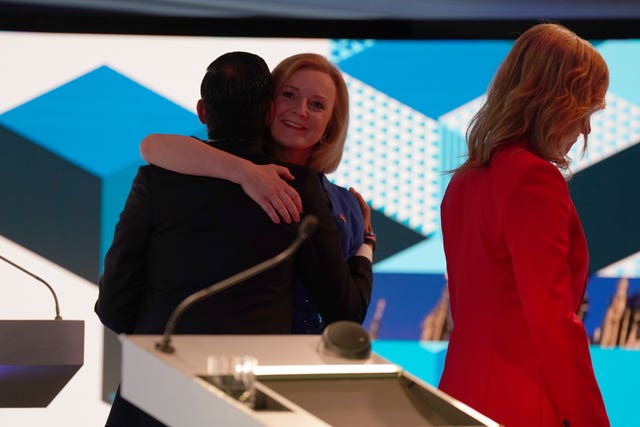
“And I have always taken the view that we should save our resources.
“I’m naturally a thrifty person. I like saving money, and it also helps the environment, so it’s about using less, wasting less, particularly food waste, which I think is a massive problem in this country.”
She added that “innovation” to “get the new technology that can help us do better” is needed.
On the three things people should change in their lives to help tackle climate change faster, Mr Sunak said reducing energy usage, recycling, and focusing on innovation for green technologies.
The former chancellor said he took advice from his two daughters who are “experts on this in our household”.




Comments: Our rules
We want our comments to be a lively and valuable part of our community - a place where readers can debate and engage with the most important local issues. The ability to comment on our stories is a privilege, not a right, however, and that privilege may be withdrawn if it is abused or misused.
Please report any comments that break our rules.
Read the rules hereLast Updated:
Report this comment Cancel